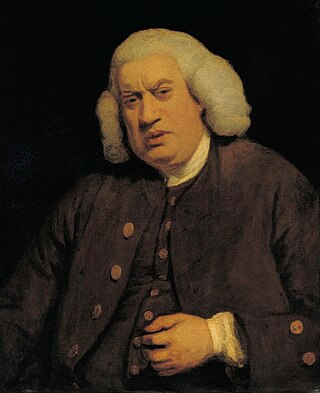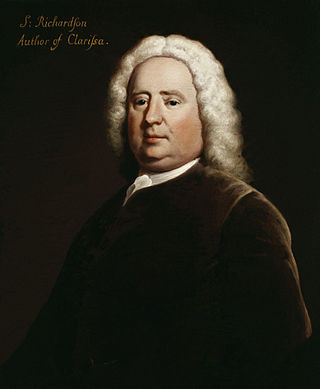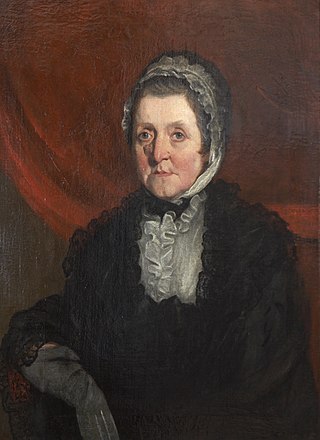
Erasmus Robert Darwin was an English physician. One of the key thinkers of the Midlands Enlightenment, he was also a natural philosopher, physiologist, slave-trade abolitionist, inventor, and poet.

Samuel Johnson, often called Dr Johnson, was an English writer who made lasting contributions as a poet, playwright, essayist, moralist, literary critic, sermonist, biographer, editor, and lexicographer. The Oxford Dictionary of National Biography calls him "arguably the most distinguished man of letters in English history".

Samuel Richardson was an English writer and printer known for three epistolary novels: Pamela; or, Virtue Rewarded (1740), Clarissa: Or the History of a Young Lady (1748) and The History of Sir Charles Grandison (1753). He printed almost 500 works, including journals and magazines, working periodically with the London bookseller Andrew Millar. Richardson had been apprenticed to a printer, whose daughter he eventually married. He lost her along with their six children, but remarried and had six more children, of whom four daughters reached adulthood, leaving no male heirs to continue the print shop. As it ran down, he wrote his first novel at the age of 51 and joined the admired writers of his day. Leading acquaintances included Samuel Johnson and Sarah Fielding, the physician and Behmenist George Cheyne, and the theologian and writer William Law, whose books he printed. At Law's request, Richardson printed some poems by John Byrom. In literature, he rivalled Henry Fielding; the two responded to each other's literary styles.

Hester Lynch Thrale Piozzi, a Welsh-born diarist, author and patron of the arts, is an important source on Samuel Johnson and 18th-century English life. She belonged to the prominent Salusbury family, Anglo-Welsh landowners, and married first a wealthy brewer, Henry Thrale, then a music teacher, Gabriel Mario Piozzi. Her Anecdotes of the Late Samuel Johnson (1786) and her diary Thraliana, published posthumously in 1942, are the main works for which she is remembered. She also wrote a popular history book, a travel book, and a dictionary. She has been seen as a protofeminist.

George Birkbeck Norman Hill was an English editor and author.

Ashbourne is a market town in the Derbyshire Dales district in Derbyshire, England. Its population was measured at 8,377 in the 2011 census and was estimated to have grown to 9,163 by 2019. It has many historical buildings and independent shops. The town offers a historic annual Shrovetide football match. Its position near the southern edge of the Peak District makes it the closest town to Dovedale, to which Ashbourne is sometimes referred to as the gateway.

Anna Seward was an English Romantic poet, often called the Swan of Lichfield. She benefited from her father's progressive views on female education.

Alleyne FitzHerbert, 1st Baron St Helens, PC was a British diplomat. He was Minister Plenipotentiary to Russia from 1783 to 1788, appointed Chief Secretary for Ireland and a member of the Privy Council in 1787, serving in the former position until 1789. He was Minister plenipotentiary to Spain from 1790 to 1794.

St Oswald's Church is a Church of England parish church located in Ashbourne, in the county of Derbyshire, England.

Penelope Boothby was a girl who has become one of the most famous child characters in British art. Her image inspired the paintings by Joshua Reynolds, Henry Fuseli, John Everett Millais, a sculpture by Thomas Banks, photographs of Lewis Carroll, sonnet of Brooke Boothby.

William Adams was Fellow and Master of Pembroke College, Oxford.

This is a list of Sheriffs of Derbyshire from 1567 until 1974 and High Sheriffs since.

There have been two baronetcies created for persons with the surname Boothby, both in the Baronetage of England. One creation is extant as of 2022.

Sir Brooke Boothby, 6th Baronet was a British linguist, translator, poet and landowner, based in Derbyshire, England. He was part of the intellectual and literary circle of Lichfield, which included Anna Seward and Erasmus Darwin. In 1766 he welcomed the philosopher Jean-Jacques Rousseau to Ashbourne circles, after Rousseau's short stay in London with Hume. Ten years later, in 1776, Boothby visited Rousseau in Paris, and was given the manuscript of the first part of Rousseau's three-part autobiographic Confessions. Boothby translated the manuscript and published it in Lichfield in 1780 after the author's death, and donated the document to the British Library in 1781.
The Anecdotes of the Late Samuel Johnson or the Anecdotes of the Late Samuel Johnson, LL.D. During the Last Twenty Years of His Life by Hester Thrale, also known as Hester Lynch Piozzi, was first published 26 March 1786. It was based on the various notes and anecdotes of Samuel Johnson that Thrale kept in her Thraliana. Thrale wrote the work in Italy while she lived there for three years after marrying Gabriel Piozzi.
Sir Edward Seymour, of Berry Pomeroy, 5th Baronet of Bradley House, Maiden Bradley, Wiltshire was an English landowner and Tory politician.

Mary Palmer was a British author from Devon who wrote Devonshire Dialogue, once considered the "best piece of literature in the vernacular of Devon." She was the mother of painter Theophila Gwatkin and sister of the artists Sir Joshua Reynolds and Frances Reynolds and of the pamphleteer Elizabeth Johnson.
Maria Elizabetha Jacson was an eighteenth-century English writer, as was her sister, Frances Jacson (1754–1842), known for her books on botany at a time when there were significant obstacles to women's authorship. In some sources her name appears as Maria Jackson, Mary Jackson or Mary Elizabeth Jackson. She spent most of her life in Cheshire and Derbyshire, where she lived with her sister following her father's death.

John Taylor of Ashbourne, Derbyshire was an English lawyer and cleric, known as a wealthy landowner and stockbreeder. He was at school with Samuel Johnson, and they became lifelong friends.
















